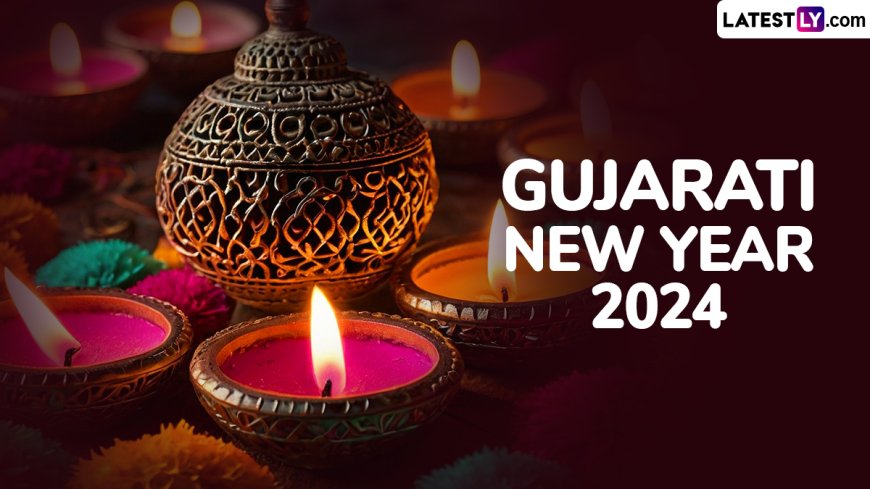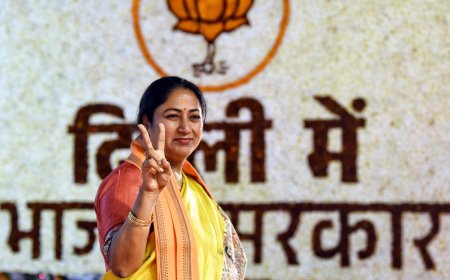Gujarati New Year, Known as Bestu Varas: Discover the Date, Origins, Importance, and Customs
Gujarati New Year, also called Bestu Varas, is a festival rich in tradition and cultural meaning, celebrated with unique rituals and joyous gatherings. This article delves into the history, importance, and practices of Bestu Varas, offering insights into how Gujarati communities welcome the new year with vibrant ceremonies. Learn about the festival’s roots, its connection to Diwali, and the customs that make it special.

Gujarati New Year, Known as Bestu Varas: Discover the Date, Origins, Importance, and Customs
Celebrated with immense joy and vibrant traditions, the Gujarati New Year—known as Bestu Varas—marks a fresh start and is deeply intertwined with the cultural and religious heritage of Gujarat. This festival, usually observed the day after Diwali, holds a significant place in the hearts of the Gujarati community. Here’s a comprehensive look at the origins, significance, and unique rituals that make Bestu Varas an exceptional celebration.
1. Understanding Bestu Varas: The Gujarati New Year
- Bestu Varas, or the Gujarati New Year, is celebrated with enthusiasm and reverence as the beginning of a new phase.
- Occurring on the day after Diwali, it signifies the start of the Hindu Vikram Samvat calendar, specifically observed in Gujarat.
- Unlike the Western New Year, which follows the Gregorian calendar, the Gujarati New Year aligns with Hindu lunisolar calculations, marking a spiritual and cultural reset.
- For the Gujarati community, Bestu Varas represents renewal, prosperity, and blessings for the year ahead.
2. Date of the Celebration: When is Bestu Varas?
- Bestu Varas falls the day after Diwali, typically in late October or early November.
- The exact date varies each year due to the lunar Hindu calendar, with the Gujarati New Year coinciding with the Kartik month’s Shukla Paksha Pratipada (first day of the waxing moon phase).
- In 2024, Bestu Varas will be celebrated on November 2, following the Diwali festivities.
- The timing highlights a significant shift from the darker days to the brightening lunar phase, symbolizing hope and positivity.
3. Historical Background of Bestu Varas
- The origins of Bestu Varas are rooted in ancient Hindu traditions and are closely connected with the beginning of the Vikram Samvat calendar.
- Legend holds that King Vikramaditya, an ancient Indian ruler, introduced the Vikram Samvat to commemorate his victory over the Sakas, an event that coincides with the new year.
- For Gujaratis, the day signifies a spiritual renewal and an opportunity to seek blessings for prosperity, wisdom, and health in the coming year.
- This festival is celebrated in Gujarat with customs that have been passed down through generations, linking present-day festivities with historical practices.
4. Significance of the Festival in Gujarati Culture
- Bestu Varas is more than just the start of a calendar year; it embodies the Gujarati spirit of renewal, gratitude, and familial bonds.
- It is a time when families come together to perform rituals, pay homage to deities, and begin new financial ventures with prayers for success.
- Businesses in Gujarat observe this day as their financial New Year, performing special poojas to invoke blessings for prosperity.
- The festival encourages individuals to let go of past challenges and look forward to a future filled with promise, emphasizing positivity and spiritual growth.
5. Traditional Rituals Observed During Bestu Varas
- Morning Puja: The day begins with a puja (prayer ceremony) to honor deities, especially Lord Ganesha and Goddess Lakshmi, seeking prosperity and wisdom.
- Annakut Darshan: Temples are decorated elaborately, and an Annakut (mountain of food) is offered to the gods, symbolizing abundance and gratitude.
- Govardhan Puja: Many families perform Govardhan Puja on this day, honoring Lord Krishna for protecting the people of Vrindavan by lifting Mount Govardhan.
- Financial Rituals: Shopkeepers and business owners initiate new account books, symbolically seeking prosperity in their ventures for the upcoming year.
- Lighting of Diyas: Houses are lit with oil lamps (diyas) to remove darkness, symbolizing the victory of light over ignorance and negativity.
6. Bestu Varas and Diwali: The Connection
- Bestu Varas follows the grand Diwali celebrations, adding an additional layer of festivity for the Gujarati community.
- Diwali night, marked by lights and joy, transitions seamlessly into the Gujarati New Year, creating a period of extended celebration.
- The themes of victory, prosperity, and family togetherness that Diwali embodies continue into Bestu Varas, emphasizing continuity and tradition.
- The festival thus represents not just the start of a new year but the continuation of Diwali’s positive energy and auspiciousness.
7. Cultural Practices: Food, Family, and Festivities
- Special Meals: Bestu Varas is a time for families to come together and enjoy a festive meal, often featuring traditional sweets and snacks.
- Exchange of Sweets and Gifts: Families and friends exchange sweets, gifts, and blessings, reinforcing bonds and spreading joy.
- Visiting Temples: Many people visit temples to offer prayers and seek divine guidance for a successful and healthy year.
- Dressing in New Attire: Wearing new clothes is customary, symbolizing freshness and a positive outlook for the new year.
8. Bestu Varas in Modern Times
- Today, Bestu Varas celebrations blend traditional practices with modern elements, allowing younger generations to stay connected to their heritage.
- Many Gujarati families outside of India also celebrate Bestu Varas, bringing cultural significance to the day even in distant lands.
- The widespread use of social media enables Gujaratis around the world to exchange greetings, share celebrations, and feel a sense of unity despite geographical distances.
- The festival’s enduring relevance demonstrates the community’s commitment to preserving its heritage and passing it on to future generations.
9. Key Symbols and Their Meanings in Bestu Varas
- Diyas (Oil Lamps): Represent the dispelling of ignorance and negativity, bringing light and clarity to the new year.
- Annakut (Food Offering): Symbolizes abundance, gratitude, and the importance of sharing wealth and resources.
- New Account Books: Known as “Chopda Pujan,” the practice of blessing new ledgers reflects the importance of ethical business practices and financial prosperity.
- Temples and Pujas: Visiting temples and performing prayers signify devotion, gratitude, and the desire for divine protection in the year ahead.
10. Gujarati New Year Wishes and Greetings
- A common greeting on Bestu Varas is “Saal Mubarak,” which translates to “Happy New Year.”
- People exchange warm wishes, blessings, and good thoughts, reflecting the spirit of goodwill and unity.
- Social media is often flooded with heartfelt greetings, allowing people across regions to celebrate together.
11. Conclusion: Bestu Varas as a Symbol of Cultural Pride and Renewal
- Bestu Varas is not only a celebration of the new year but also a reflection of Gujarati heritage, values, and devotion.
- Through meaningful rituals, family gatherings, and cultural customs, Bestu Varas serves as a reminder of the importance of gratitude, unity, and hope for the future.
- The festival’s enduring significance highlights the Gujarati community’s deep-rooted connection to tradition, inspiring new generations to honor their culture.
- As families light diyas and offer prayers, Bestu Varas encapsulates the hope, happiness, and faith that guide the community into the upcoming year.
Gujarati New Year, or Bestu Varas, is more than just a festival; it’s a vibrant celebration of heritage, unity, and renewal for the Gujarati community. With traditions dating back centuries, this day brings families together, marks a fresh beginning, and reflects the hope and positivity that fuel a prosperous year ahead. As Bestu Varas is celebrated across Gujarat and beyond, it stands as a testament to the enduring spirit of Gujarati culture and the values that connect the community.
What's Your Reaction?






















































